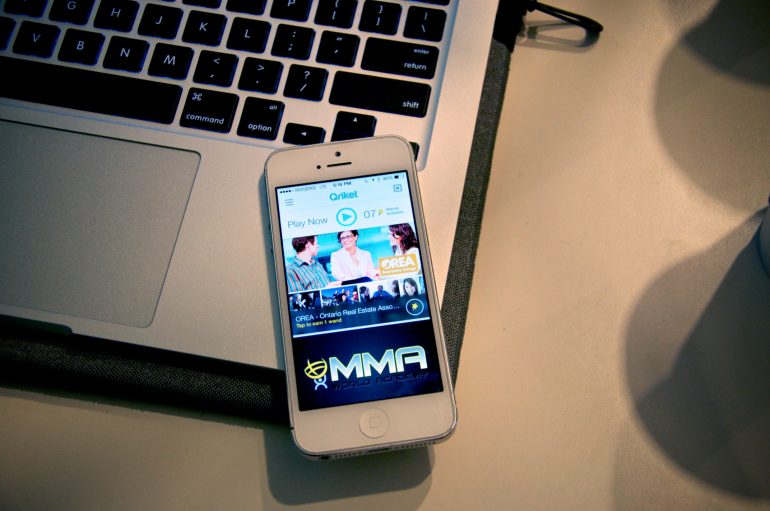For 22-year-old Qriket cofounder Jonny Comparelli, things are aren’t too shabby these days. Approaching five years (yes, he started working on it when he was an 18-year-old University of Toronto dropout), the company has now earned over $2 million in revenue, sharing $1.4 million of that with its users.
Wait…what?
Qriket is an app that gamifies the consumption of media. Upon logging into the app, users see their “Qriket feed,” where offers and deals from local businesses are displayed. Whether users choose to engage with those offers is where it get interesting.
Every user is allotted three spins from a virtual wheel every day, in which they can win $0.05 to $500 in real money per spin (the money is transferrable to a PayPal account). Advertisers provide the startup’s revenue, who can offer digital coupons and deals to targeted users (users choose whether or not they would be interested in such a deal). If they are interested in receiving a coupon for, say, a two-for-one appetizer at a restaurant in downtown Toronto, they can earn another wheel spin for more money.
In this way it allows brands to pay for engagement with only targeted, “opted-in” users. Brands pay between $0.25 to $2.00, and Qriket offers them a 30-second video that gets shown to targeted users, free of charge. The app then reports impression rates of the video back to brands, who can survey the users they’re targeting and ask them if they’d be interested in a specific offer or deal.
“What the clients are paying us is that distribution of the deal to those ‘yes’ replies, so they’re not targeting those that aren’t interested,” said Comparelli. “We give 40 percent of everything we make back to our users and it continues back into our prize pool allocation. Our users are basically sharing the revenue.”
It uses geo-tagging to offer users in a given city-centre relevant media. Toronto has been the first market that they focused on and growing too fast could be harmful. That’s because if they we’re to take on a million additional users tomorrow, they’d have to find a million dollars a day to give away.
Currently they stand at just over 105,000 active users, a number that’s doubling every 26 days. The brands that are advertising with Qriket have experienced “very effective and engaging” click-through rates.
Founded in 2008, the company started by gamifying QR codes in 2009, as Comparelli explained. User downloaded the app and went around the city, leveraging deals and spins by scanning QR codes. The first pot was $5,000 and the company’s first $50,000 to put on those contests came from family and friends. Along the way they gained enough attention to build their user base and gain enough brand partners (all from inbound marketing, Comparelli added).
But the company still found ways to use QR codes, even thought it’s not part of its main strategy. In September 2012 it undertook a 14-city pilot project with Metro newspapers. Metro’s online editorial content had QR codes attached to them for readers to access stories that didn’t make print, “so we drove Qriket users to pick up the Metro and engage with those same QR codes. We then increased their daily traffic to those same codes about 1,100 percent, or about 50 to 60,000 readers”
“It turned out to be so disruptive to what they were doing because they could come to us and target the specific audience that they wanted instead of spending $5,000 for a single, static ad,” he said.
In the future, ideally in 2014’s third quarter, Qriket hopes to bring back QR codes to ideally be printed on receipts for purchases made with partnered brands, earning users more wheel spins.
After two years of operating in 2011, the company finally secured its first investment, a $500,000 angel round from Norwegian businessman Alexander Vik. In the summertime the cofounders will seek to raise another round to fund a complete expansion to New York City, and ideally 10-15 cities after that.
Growth needs to be handled slow and steady with an app like this, given the revenue structure. From the way Toronto went though, Comparelli is confident in Qriket’s future.
“We’re taking it very slowly and building each market one-by-one, and we learned that quite quickly when we started,” he said, referencing the early days when Qriket was paying users but still struggling to monetize. “We’ve had a tremendous success in a small market like Toronto, so we’re really excited to see where it goes.”


